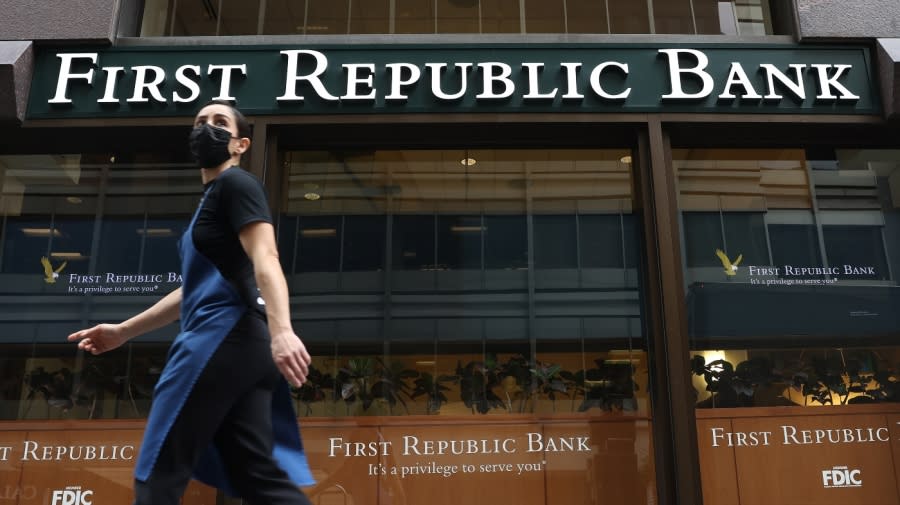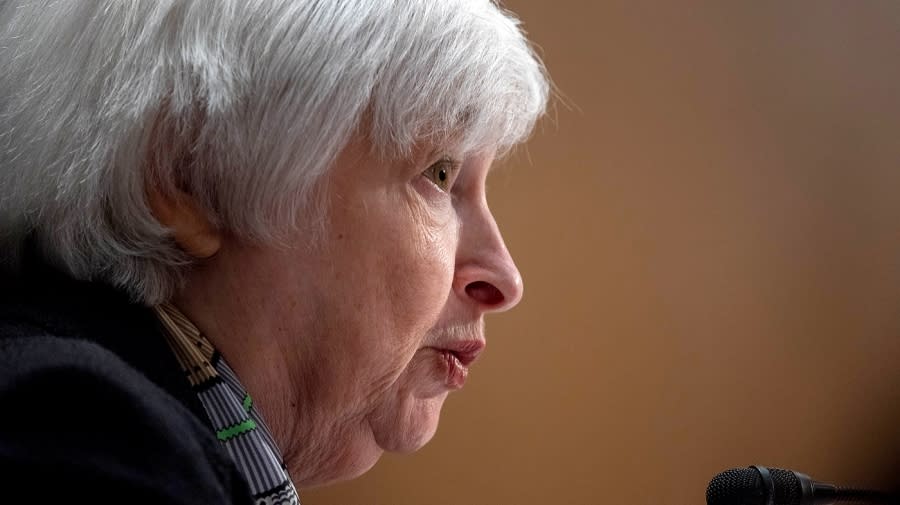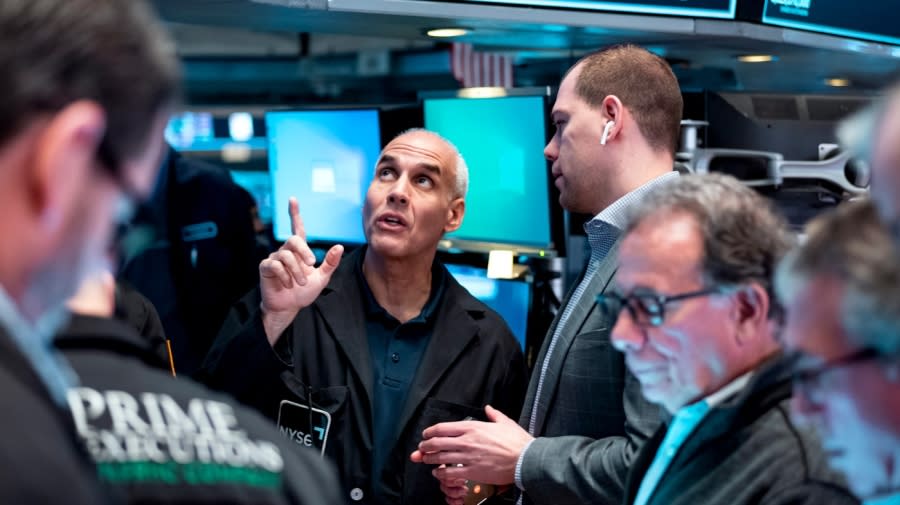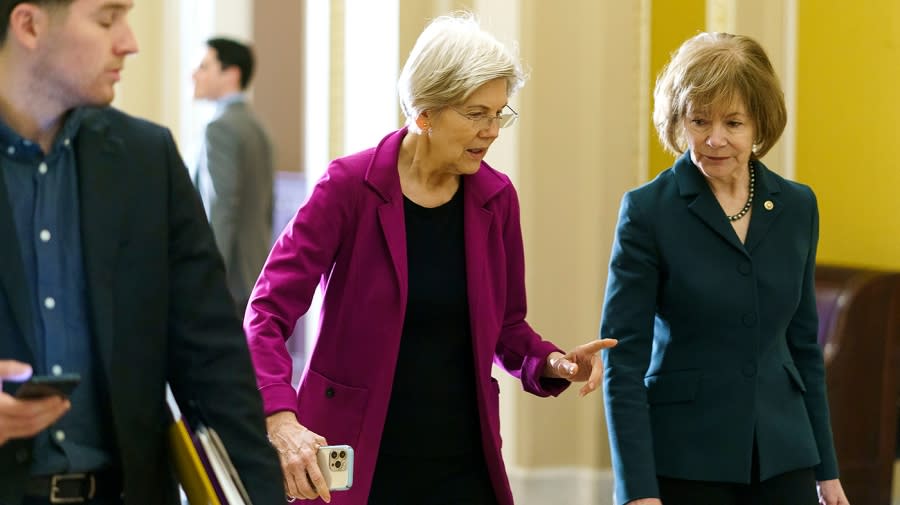What you need to know about this week’s banking crisis
Markets and policymakers have been waiting for the other shoe to drop since the collapse of Silicon Valley and Signature banks last week, fearing a broader international banking crisis.
Concerns about the health of First Republic Bank and slew of other regional powerhouses rattled markets for weeks and the troubles facing Credit Suisse added an international element to the meltdown.
What to know: First Republic Bank getting bailed out by large banks
While the global financial system may not be in the clear yet, crucial support for First Republic and Credit Suisse have helped calm some fears.
Here’s what you need to know about how the financial system is handling the fall of Silicon Valley Bank.
First Republic is getting bailed out by other banks

First Republic looks like it’ll get by with a little help from its friends.
Eleven of the biggest U.S. banks are throwing together up to $30 billion to bolster the teetering San Francisco-based regional bank, according to a joint Thursday statement from federal financial regulators.
The megabanks — which include JPMorgan Chase, Bank of America, Citigroup, Wells Fargo, and several others, according to reports — would deposit up to $5 million each with First Republic in order to keep the bank solvent and sturdy.
Regional banks continue steep declines amid banking crisis
First Republic has faced severe pressure from investors and customers after the collapse of Silicon Valley Bank over the weekend. Like SVB, First Republic is based in Northern California and holds a significant amount of uninsured deposits, which triggered alarms among analysts.
Shares of First Republic have whipsawed throughout the week amid concerns about its financial health and whether it would be the next major bank to fail.
First Republic boasts roughly $271 billion in assets and could send shockwaves throughout the banking system if it, too, collapsed.
The burgeoning rescue plan, however, appeared to calm concerns on Wall Street. First Republic shares closed with a gain of 10.2 percent Thursday at a price of $34.35, but still well below the $115 per share it closed on the eve of SVB’s death spiral.
Credit Suisse is also on track to receive help from the Swiss National Bank, which has quashed some fears of an international banking crisis set off by SVB.
Yellen says ‘banking system is sound’

Even before the news of the First Republic bailout emerged, Treasury Secretary Janet Yellen sought to reassure Americans that their money is safe.
“I can reassure the members of the committee that our banking system is sound, and that Americans can feel confident that their deposits will be there when they need them,” Yellen told the Senate Finance Committee.
Read more: US financial system is sound, Yellen tells lawmakers
“This week’s actions demonstrate our resolute commitment to ensure that our financial system remains strong and the depositors’ savings remain safe,” she continued.
Despite the fears circling several regional banks, the Federal Deposit Insurance Corp. (FDIC) has not had to take over any new failed banks or rush to rescue their deposits since SVB and Signature Bank collapsed over the weekend.
The Federal Reserve has also launched an emergency lending facility through which banks can exchange Treasury bonds and other securities for cash loans, which should help many firms avoid similar bank-run scares.
“The reason the banking agencies intervened Sunday night … was that the risk was that the run would go from some banks to all banks. That risk is substantively quashed because of the Fed’s backstop.” said Karen Shaw Petrou, managing partner at Federal Financial Analytics.
Even so, Petrou warned, “this is a situation that is driven by fear, and that brings out adrenaline, and depositors can’t fight, so they flee. Any additional sign of anything even a little scary could start this up again.”
Markets are trampolining amid uncertainty

Markets on Thursday opened sharply down before rebounding on news that First Republic would receive support from its competitors.
The Dow Jones Industrial average dropped more than 200 points in early trading before jumping nearly 700 points to finish more than 370 points up on the day.
Trading earlier in the week was similarly volatile. On Monday, markets jumped on the news that the Federal Deposit Insurance Corporation (FDIC) would be fully insuring accounts at SVB before taking a dive on fears of a wider contagion.
More gains followed later in the week buoyed by hopes that the Fed would take a break from hiking rates. Those were also wiped out after financial behemoth Credit Suisse asked the Swiss National Bank for a bailout.
On the week the Dow is up about 400 points.
Lawmakers are pointing fingers all over the place

Lawmakers on the Senate Finance Committee sparred with one another on Thursday about who should be to blame for the current spate of bank failures.
Democrats largely blamed banking regulations that were loosened under the Trump administration and Republicans pointed the finger at regulators in the Biden administration along with interest rates, but the criticisms were too wide-ranging to fall along party lines.
Sen. Elizabeth Warren (D-Mass.) said it was the fact that banks of SVB’s size are no longer required to be stress-tested is what led to the bank’s collapse.
“In 2018, Trump’s bank deregulation law and the door it opened for Fed chair Powell to further hack away at the rules created an exception to annual Fed-administered stress tests, letting banks from $50 billion to $250 billion effectively off the hook,” she said.
Is deregulation to blame? Warren, Porter unveil bill to undo Trump-era Dodd-Frank rollback
“It is important to learn more about what initiated the run on Silicon Valley Bank, the impact of the Federal Reserve holding interest rates low for too long, and what steps were or were not taken by Silicon Valley Bank and the banking regulators,” lead Republican Mike Crapo (Idaho) said.
Sen. Mark Warner (D-Va.) called out “bad actors” in the venture capital (VC) industry whose behavior led to a panic.
“I was a venture capitalist before. I think there were some bad actors in the VC community who literally started to spur this run by virtually crying fire in a crowded theater,” Warner said.
Democrat Michael Bennet (Colo.) excoriated SVB bank managers in particular for holding so many bonds on its portfolio while interest rates were being raised at the fastest pace in decades.
What’s next: Jeffries meets with San Francisco Fed following Silicon Valley, Signature bank collapses
“[Federal Reserve Chair] Jay Powell wasn’t exactly secretive about what he was doing. They had to get that through their board, they had to get that through their audit committee, and somehow they had to get that through a regulator who was looking over that and who wasn’t saying, ‘This is insane what they’re doing,’” he said.
Taxpayers don’t want to be on the hook for turmoil in the financial sector
New public opinion polling by Ipsos on how the government should be dealing with turmoil in the financial sector shows that a large majority of Americans believe that taxpayers shouldn’t have to support banks that are poorly managed.
According to the poll released Wednesday, “84 percent of Americans agree – 56 percent agree strongly – that taxpayers should not have to foot the bill for irresponsible bank management, including 85 percent of Democrats and 86 percent of Republicans.”
Not again: ‘Unfortunate and wrong’: Angry taxpayers respond to latest bank bailouts
The poll found that just under half of Americans are in favor of government bailouts of U.S. financial institutions at 49 percent. That compares to just 37 percent of Americans who were in favor of bailouts in 2012.
“It just seems unfair that it’s always the banks that are getting bailed out and not the people who seem to be more and more in need with inflation, rising costs and stagnating wages,” Western Governors University student Victoria St. Louis told The Hill in an interview this week.
For the latest news, weather, sports, and streaming video, head to The Hill.

